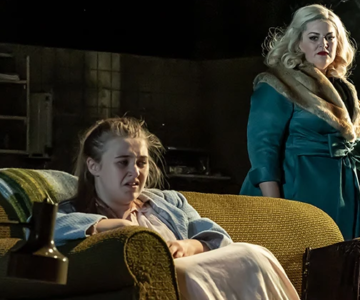 A German Life at the Bridge Theatre: Maggie Smith is a Treasure; This Show is Notby Randi / May 9, 2019
A German Life at the Bridge Theatre: Maggie Smith is a Treasure; This Show is Notby Randi / May 9, 2019The minute you walk in the joint, you can tell this was a show of distinctionnnn A REAL BIG SPENDER. Okay I’ll try to stop doing that (no promises), but man I’m not lying about the game being ON as soon as you enter the Donmar, all redone in the style of Andy Warhol’s 1950s factory. Sure the style redo doesn’t technically add anything for the story, but this specific anachronism doesn’t harm the story at all so I have no issue with their going for a cool look. And every other inch of this stunning, shocking, poignant revival is pitch perfect, not only serving the story but improving its meaning and deepening its emotional reach, in a way I never ever would have guessed was possible from knowing this show in previous incarnations.
As soon as the beat dropped (in my heart #jasonmendoza) and Anne-Marie Duff’s Charity started speaking to the pace of her quick-beating heart, jumping too quickly at any semblance of affection (as well as into a BUBBLE PIT LAKE, want) and latching onto it though it was always too slippery to grasp, I was in awe. No longer simply a good-hearted, down-on-her-luck heroine, we’re finally reminded after too many bland, uninspired revivals that Charity is a tragic character, in a fully heartbreaking tragic tale like the old school Greeks did. Charity is no simple sweet gal; she is a poor aging woman who life continues to beat like a piñata yet she always retains hope that the piñata is full of candy so she’s like ‘I guess the beating from life is okay because maybe candy?’ but it never is candy, poor sweet Charity, it never is. It’s always more and more unfair bullshit and she deserves better and NEVER GETS IT and finally, thanks to Anne-Marie Duff in a true masterclass of performance and character understanding, that’s the Charity portrayed in all her pitiful, tragic glory.
Josie Rourke’s meticulous, brilliant direction uses every inch of Cy Coleman and Dorothy Fields’ score and Neil Simon’s book to prove that this show is one of the great tragedies of musical theatre, exemplified by the super-slowed down version of “Big Spender” that, in its almost painstakingly slower meter, let the grit and devastation and more than anything desperation of the taxi dancers fill in all the slower gaps in the beat. You could tell the audience, recognizing the song, wanted to tap their feet and bop along in their seats, but Josie was like NO, SIT STILL, IT’S DEPRESSING. It was great. The other most well-known song in the show, though, was pure adorable joy, when Duff perfected, really, I mean, perfected, “If My Friends Could See Me Now”, when she finds herself in the apartment of a famous movie star (a fantastic Martin Marquez). With her scratchy voice that reminded me at times of Alice Ripley in Next to Normal (though with more optimism than Diana) in how it can use its jagged edges to cut directly to your core, Duff made this moment a delight, with nothing threatening to take it from her, like with all her future moments of happiness.
Another standout song, a song that I had forgotten about, was the determined number between Charity, ensemble standout Lizzy Connelly, and a great Debbie Kurup, “There’s Gotta be Something Better Than This”, a resolution among three pretty defeated women to ‘get up, get out’ and live a better life. Sharpening the emotional impact of what was already flawless was the painful reprise at the end, a knife through all our hearts that were already BROKEN ENOUGH from the preceding actions, jfc were Coleman and Simon and freaking Dorothy trying to kill us??
On top of all this, they also managed to include the most provocative version of Oscar (Arthur Darvill). Instead of just a one-note ‘nice’ guy who, like all ‘nice’ guys, ends up not being so nice, he was the epitome of toxic masculinity, representing in his averageness all the regular men who believe #notallmen yet still cannot condone women who live life on their own terms, women who don’t fit inside their controlling, oppressive box. Instead of feeling bad for Charity that Oscar isn’t what she’d hoped, you feel angry at Oscar for being such a weak man (and, though you hate to see her sad, glad that Charity found out before she devoted her life to him).
Honestly, if every revival brought half as much heart and inspiration to its reworking of classics, we would have endless amazing, transformative theatre. Rourke’s Sweet Charity sets a new benchmark that I hope future revivals can meet, but they’re gonna have a hard time trying.




